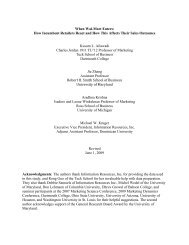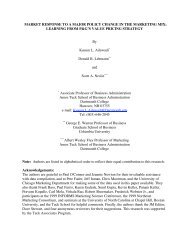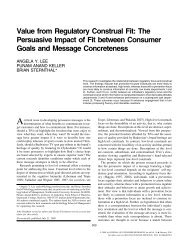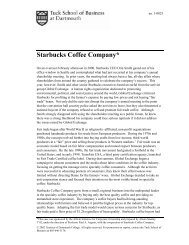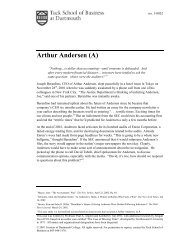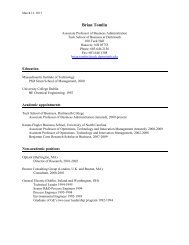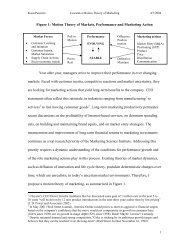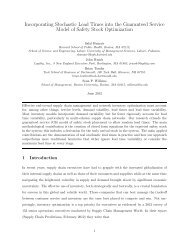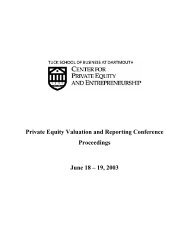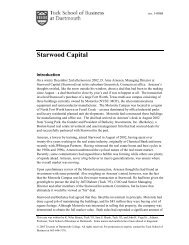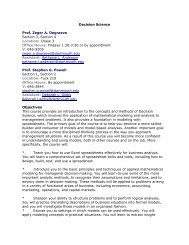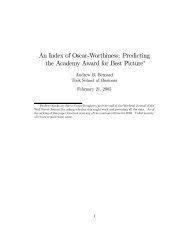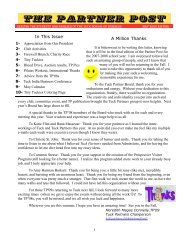tax notes international - Tuck School of Business - Dartmouth College
tax notes international - Tuck School of Business - Dartmouth College
tax notes international - Tuck School of Business - Dartmouth College
Create successful ePaper yourself
Turn your PDF publications into a flip-book with our unique Google optimized e-Paper software.
NEWS ANALYSIS<br />
Minding the Book-Tax Gap<br />
by Joann M. Weiner<br />
For too long, <strong>tax</strong> policy experts have acted as if<br />
financial transactions have no impact on the real<br />
economy. If the current economic crisis, which financial<br />
transactions largely spawned, hasn’t clearly established<br />
that connection, then it’s time for <strong>tax</strong> policymakers<br />
to go back to business school.<br />
Experts in financial accounting and <strong>tax</strong> policy made<br />
that point loud and clear at the 12th annual UNC Tax<br />
Symposium held January 23 and 24 at the Kenan-<br />
Flagler <strong>Business</strong> <strong>School</strong> at the University <strong>of</strong> North<br />
Carolina in Chapel Hill. 1<br />
‘‘We want to take a big-tent approach and broaden<br />
our audience to scholars outside the accounting community,’’<br />
said Douglas A. Shackelford, the Meade H.<br />
Willis Distinguished Pr<strong>of</strong>essor <strong>of</strong> Taxation at UNC.<br />
‘‘Accountants know the difference between reported <strong>tax</strong><br />
expenses and actual <strong>tax</strong>es paid. It is time for others to<br />
understand the implication <strong>of</strong> this difference.’’<br />
The importance <strong>of</strong> this outreach should not be underestimated<br />
as accounting rule makers and <strong>tax</strong> policymakers<br />
begin to focus on issues such as how differences<br />
in book and <strong>tax</strong> accounting may lead firms to<br />
manipulate their financial statements, <strong>tax</strong> filings, or<br />
both, Shackelford added.<br />
Pr<strong>of</strong>. Joel Slemrod <strong>of</strong> the University <strong>of</strong> Michigan<br />
warned that economists might be missing the policy<br />
impact because they ignore the financial accounting<br />
issues. ‘‘This could be a really, really big issue. If financial<br />
decisions are correlated across firms with respect<br />
to <strong>tax</strong> policy, the errors we make might be compounded,’’<br />
Slemrod said.<br />
Accounting for Income Taxes<br />
Public corporations expend much effort properly<br />
accounting for their income <strong>tax</strong>es, yet practitioners rou-<br />
1 The UNC Tax Symposium papers are available at http://<br />
areas.kenan-flagler.unc.edu/Accounting/<strong>tax</strong>sym09/Pages/<br />
AcceptedPapers.aspx.<br />
tinely condemn the poor quality <strong>of</strong> the information,<br />
implying that it is relatively useless. However, researchers<br />
disagree, as they use these data to analyze<br />
many issues concerning the <strong>tax</strong> position <strong>of</strong> public corporations.<br />
The <strong>tax</strong> information reported in financial accounts<br />
is critically important to researchers for one simple reason:<br />
The <strong>tax</strong> information reported on corporate <strong>tax</strong><br />
returns is confidential. Thus, financial statements are<br />
generally the only source <strong>of</strong> public information about a<br />
corporation’s <strong>tax</strong> situation.<br />
The reliability <strong>of</strong> financial information is important<br />
not only in the academic world, but also in the real<br />
world. Policymakers regularly rely on financial statement<br />
<strong>tax</strong> information, and studies based on that information,<br />
to guide their <strong>tax</strong> policies. Thus, understanding<br />
the real implications <strong>of</strong> how firms account for their<br />
income <strong>tax</strong>es is one <strong>of</strong> the most critical issues <strong>tax</strong><br />
policy analysts face today.<br />
Along with coauthors John Graham <strong>of</strong> Duke University<br />
and Jana Smith Raedy <strong>of</strong> UNC, Shackelford<br />
presented the report, ‘‘Research in Accounting for Income<br />
Taxes,’’ highlighting the importance <strong>of</strong> understanding<br />
how the financial accounting treatment <strong>of</strong> income<br />
<strong>tax</strong>es has a real effect on <strong>tax</strong> policy.<br />
For example, the authors note that when <strong>tax</strong> law<br />
and financial accounting treat transactions in the same<br />
manner, the accounting for income <strong>tax</strong>es is ‘‘straightforward,<br />
intuitive, and relatively simple.’’ But when<br />
book and <strong>tax</strong> treatment differ, the <strong>tax</strong> accounts can<br />
materially affect both the income statements and balance<br />
sheets, the authors cautioned.<br />
Those book-<strong>tax</strong> differences are not trivial. The most<br />
recent IRS data from 2005 show that corporations reported<br />
about $32 billion less in <strong>tax</strong>able income than in<br />
book income, which reduced their 35 percent statutory<br />
<strong>tax</strong> rate to an effective <strong>tax</strong> rate <strong>of</strong> about 23.5 percent.<br />
The authors evaluate how well the <strong>tax</strong> information<br />
in financial statements does in approximating actual<br />
<strong>tax</strong> return information and for assessing a firm’s <strong>tax</strong><br />
strategy. In a word, the answer is ‘‘poorly.’’ This poor<br />
performance is not the fault <strong>of</strong> the accounting statements,<br />
which are designed to provide information<br />
about the firm’s financial condition and not its <strong>tax</strong> status.<br />
But more worrisome to the authors is that ‘‘attempts<br />
to extract confidential <strong>tax</strong> return information<br />
TAX NOTES INTERNATIONAL FEBRUARY 2, 2009 • 371<br />
(C) Tax Analysts 2009. All rights reserved. Tax Analysts does not claim copyright in any public domain or third party content.



